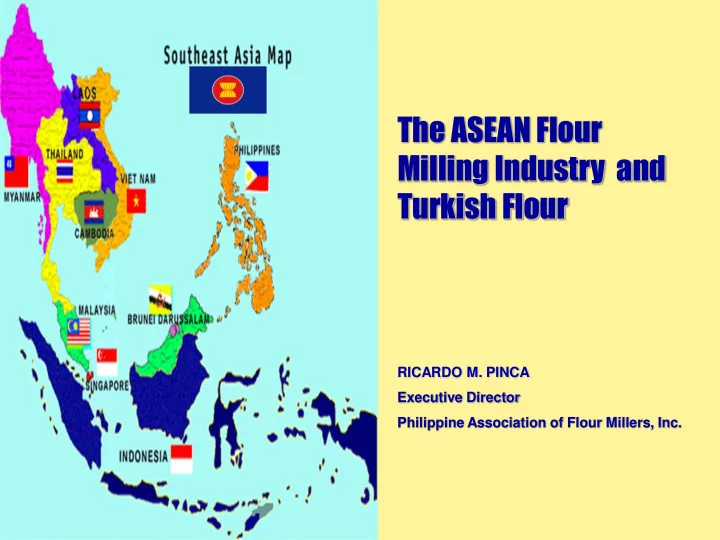

The ASEAN Flour Milling Industry and Turkish Flour RICARDO M. PINCA Executive Director Philippine Association of Flour Millers, Inc.
MAJOR FLOUR EXPORTERS TO SOUTH ASIA IN 2010 Source: Global Trade Information Service (Calendar Year)
TURKISH FLOUR EXPORTS TO INDONESIA
TURKISH FLOUR EXPORTS TO PHILIPPINES
TURKISH FLOUR EXPORTS TO THAILAND
TURKISH FLOUR EXPORTS TO MALAYSIA
TURKISH FLOUR EXPORTS TO SINGAPORE
TURKISH FLOUR EXPORTS TO ASEAN REGION *Year to date (June) Source: Global Trade Information Service (Calendar Year)
TURKISH FLOUR ISSUE Turkey is the world second biggest exporter of wheat flour after Kazakhstan. Turkey wheat flour exports in 2010 reached 1,847,480 MT with total value of US$600 Million. IGC predicts Turkish flour exports for 2011 would be at the same volume in 2010. The average flour export FOB price in 2010 was US$325.00/MT. To the Philippines it was $276/MT. The average for FOB PNW SW in 2010 was $286/MT
TURKISH FLOUR ISSUE Turkey’s biggest export market is Iraq with 2010 volume of 829,207 MT and valued at US$300 Million. Turkey’s second biggest export market is Indonesia with 2010 volume of 462,005 MT and valued at US$131 Million
TURKISH FLOUR ISSUE The third biggest export market is the Philippines. Total 2010 export was 100,128 MT valued at US$27 Million. Philippines recorded only 83,745 MT of Turkish imported flour arrivals in 2010 or a discrepancy of about 16.36%. This is due to smuggling. Export prices to the Philippines were lower compared to export prices to Iraq, Indonesia and Thailand. Year Country FOB/MT 2010 Iraq $361/mt 2010 Indonesia $284/mt 2010 Philippines $276/mt 2010 Thailand $317/mt Source: Turkish Commodity Exchange Data
TURKISH FLOUR ISSUE TURKISH FLOUR EXPORT PRICES TO ASEAN FOB US$/MT ASEAN 2007 2008 2009 2010 2011 Indonesia $291 $478 $279 $284 Philippines $235 $428 $290 $276 $320-$400 Thailand $248 $494 $331 $317 Malaysia $275 $461 $297 $250 Singapore $316 $445 $289 $277 Iraq $328 $521 $354 $361 Turkish Domestic Flour Prices/MT $600 $600
TURKISH FLOUR ISSUE BUSINESS LOST TO TURKISH FLOUR 2007 - 2010 TOTAL AMT ASEAN MEMBERS 2007 2008 2009 2010 IN 4 YEARS Indonesia $47,273,823 $118,899,154 $123,626,016 $131,209,704 $421,008,697 Philippines $283,880 $7,156,588 $18,703,840 $23,113,620 $49,257,928 Thailand $534,688 $9,035,260 $9,818,453 $11,625,658 $31,014,059 Malaysia $221,650 $1,554,492 $3,354,615 $3,105,750 $8,236,507 Singapore $188,020 $982,115 $2,492,914 $2,581,917 $6,244,966 TOTAL ASEAN $48,502,061 $137,627,609 $157,995,838 $171,636,649 $515,762,157
TURKISH FLOUR ISSUE Domestic Flour Prices in Turkey versus Turkish export prices: Domestic Prices: Date Manufacturer Flour Type Price/MT 11-2010 Ulusoy Bread Flour US$612.5/mt Bread Flour US$600.0/mt Yeni Bread Flour US$575.0/mt Bread Flour US$562.0/mt Export Prices: 2011 June FOB$389.41/mt 2010 FOB$276.00/mt 2009 FOB$278.06/mt 2008 FOB$329.77/mt 2007 FOB$229.42/mt 2006 FOB$187.00/mt Note: Domestic flour prices in Turkey in 2010 was at FOB$612.5/mt, however, the export average flour price in 2010 was only at FOB$276.0/mt.
Turkey Wheat Situation
TURKISH FLOUR ISSUE Turkish Government Subsidy System: Inward Processing License – Millers holding IPL can buy 1. wheat at prices lower than domestic commercial prices from the Turkish Grain Board (TMO) provided these are sold to the export market. 2. IPL holders can also import wheat duty and VAT free for EXPORT only. Non-IPL holders have to pay a 130% customs tax on wheat imports. 3. Government allocated one million MT wheat import quota to TMO duty free on February 2011 to be used until December 2011 for sale thru tender to millers.
Conclusions and Recommendation: • The viability of the Turkish milling industry is based on importing wheat to produce usable flour while creating an exportable supply of flour that is dumped in South Asian markets at landed prices below FOB wheat prices in the US and below domestic Turkish feed wheat prices. • Turkish flour imports are jeopardizing the stability of the ASEAN flour milling industry. • The Turkish flour industry states that it intends to increase exports as a result of the current system. • The surging entry of Turkish flour to the ASEAN market creates a food security issue. Even as it endangers the viability of flour milling industry in ASEAN countries Turkish flour imports remain as an unstable and undependable supply as it is also dependent on the availability of grains from foreign sources that usually embargo food exports to protect domestic supply. • There is a need for a united ASEAN action to expose and ultimately stop the subsidized and unfair export of Turkish flour to ASEAN.
TH THANK Y ANK YOU! OU!!! !!
Recommend
More recommend